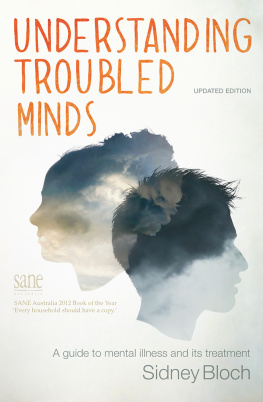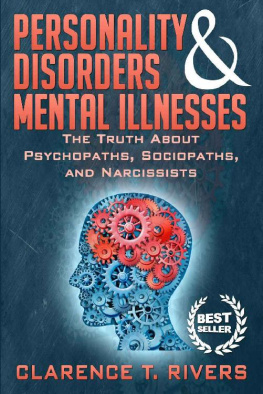Police Responses to People with Mental Illnesses
According to the World Health Organisation during their lifetime more than one quarter of all individuals will develop one or more mental or behavioural disorders. Given prevalent data like this it is not surprising that wherever they reside on the planet many persons suffering from a mental disorder, or as is more commonly termed in popular parlance a mental illness, are likely to come into contact with police at some stage in their lives. Indeed, research conducted in a number of countries suggests that about 10 per cent of all community police work involves some form of interaction with a person with a mental illness. From a police perspective these encounters are not only frequent but also often sensitive and challenging.
Despite the difficulties associated with this important aspect of community policing surprisingly scant attention has been given to the development of empirically tested and established best practice approaches to managing police interactions with persons with mental illnesses. The literature that does exist is principally derived from North American sources although more recent and interesting developments have been reported in Australia and the United Kingdom.
The principal aim of Police Responses to People with Mental Illnesses is to seek to reduce this gap in the literature by providing an international overview of some of the latest research and policy developments in the field, and the challenges still to be confronted in many places in overcoming cultural and associated barriers to protecting the rights of the mentally ill.
This book was originally published as a special issue of Police Practice and Research: An International Journal.
Duncan Chappell, a lawyer and criminologist, is currently an Adjunct Professor in the Faculty of Law at the University of Sydney, Australia and a Conjoint Professor in the School of Psychiatry in the Faculty of Medicine at the University of New South Wales, Australia. He is the immediate past President of the New South Wales Mental Health Review Tribunal, and a past Director of the Australian Institute of Criminology.
Police Practice and Research
Series Editor: Dilip K. Das
International Police Executive Symposium
Police Practice and Research is a series of books based on special issues of the pioneering peer-reviewed journal Police Practice and Research: An International Journal, which presents current and innovative police research as well as operational and administrative practices from around the world. It seeks to bridge the gap in knowledge that exists regarding who the police are, what they do, and how they maintain order, administer laws, and serve their communities. The journal is published in association with the International Police Executive Symposium (IPES), which brings police researchers and practitioners together to facilitate cross-cultural, international and interdisciplinary exchanges for the enrichment of the policing profession.
Policing: Toward an Unknown Future
Edited by John Crank & Colleen Kadleck
Innovative Possibilities
Global Policing Research and Practice
Edited by Les Johnston & Clifford Shearing
Police Responses to People with Mental Illnesses
Global Challenges
Edited by Duncan Chappell
Police Reform from the Bottom Up
Officers and their Unions as Agents of Change
Edited by Monique Marks and David Sklansky
Police Responses to People with Mental Illnesses
Global Challenges
Edited by
Duncan Chappell
Series edited by
Dilip K. Das
First published 2012
by Routledge
2 Park Square, Milton Park, Abingdon, Oxon, OX14 4RN
Simultaneously published in the USA and Canada
by Routledge
711 Third Avenue, New York, NY 10017
Routledge is an imprint of the Taylor & Francis Group, an informa business
2012 Taylor & Francis and IPES (International Police Executive Symposium)
This book is a reproduction of Police Practice and Research: An International Journal, volume 11, issue 04. The Publisher requests to those authors who may be citing this book to state, also, the bibliographical details of the special issue on which the book was based.
All rights reserved. No part of this book may be reprinted or reproduced or utilised in any form or by any electronic, mechanical, or other means, now known or hereafter invented, including photocopying and recording, or in any information storage or retrieval system, without permission in writing from the publishers.
Trademark notice: Product or corporate names may be trademarks or registered trademarks, and are used only for identification and explanation without intent to infringe.
British Library Cataloguing in Publication Data
A catalogue record for this book is available from the British Library
ISBN13: 978-0-415-69937-2
Disclaimer
The publisher would like to make readers aware that the chapters in this book are referred to as articles as they had been in the special issue. The publisher accepts responsibility for any inconsistencies that may have arisen in the course of preparing this volume for print.
Contents
Duncan Chappell
Dorothy Cotton and Terry G. Coleman
Melissa Reuland
Rhonda Moore
T. Wing Lo and Xiaohai Wang
Katrina Clifford
Stephen Barron
Stephen Barron, a former serving police officer in New South Wales, Australia, is now a practicing forensic psychologist. The contributed paper is based on his doctoral research at Charles Sturt University, Australia, where he continues to teach.
Duncan Chappell, a lawyer and criminologist, is currently an Adjunct Professor in the Faculty of Law at the University of Sydney, Australia and a Conjoint Professor in the School of Psychiatry in the Faculty of Medicine at the University of New South Wales, Australia. He is the immediate past President of the New South Wales Mental Health Review Tribunal, and a past Director of the Australian Institute of Criminology.
Katrina Clifford is a PhD candidate in the Faculty of Arts and Design at the University of Canberra, Australia, where she is completing a thesis on the discursive representations of fatal mental health crisis interventions. She was also involved as a Research Assistant on Charles Sturt Universitys evaluation of the NSW Police Force Mental Health Intervention Team (MHIT) pilot program.
Terry G. Coleman was a police officer in Calgary and Moose Jaw for 39 years, including ten and a half years as Moose Jaws Chief of Police. Subsequently, from 2007 to 2009, he was Deputy Minister of Corrections, Public Safety and Policing, and Deputy Minister of Municipal Affairs in Saskatchewan. He is a long-time member of the Canadian Association of Chiefs of Police (CACP) having been a director as well as co-chair of the CACP Police/Mental Health Committee. Coleman has a Master of Human Resource Management and a Master of Arts Police Studies from the University of Regina, Canada, where he is now a doctoral candidate. His research focus is the measurement of organizational performance in police organizations.
Dorothy Cotton is a registered psychologist and a diplomate in police psychology. She has been extensively involved with the Canadian Association of Chiefs of Police (CACP) in developing strategies to develop and improve police interactions with people with mental illness through program development, research, and training. She is currently a clinical neuropsychologist with Correctional Service Canada, and an adjunct assistant professor at Queens University, past President of the College of Psychologists of Ontario, and a Fellow of the Canadian Psychological Association. Both she and Terry G. Coleman are also members of the Mental Health and the Law Advisory Committee of the Mental Health Commission of Canada (MHCC). Together, the authors are the principal consultants of PMHL Solutions, whose focus is on police/mental health systems issues in Canada.













